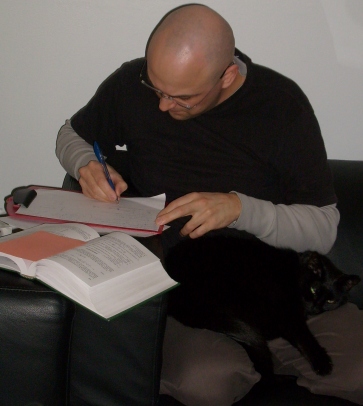Brief Bio
 While not much good for small talk, I am fully committed to openness in my courses. My exams are no secret: nearly every exam I've crafted in the past few years is right here on this site. Notes, assignments, syllabi, and other content also roam the realm unfettered. All documents are wrought using LaTeX, which is free; and all web pages are coded using straightforward HTML, CSS, and a bit of JavaScript, also free. I have little love for privately-owned, profit-motivated "online learning environments" and use a minimum of proprietary software. None of my courses are hidden away behind passwords in places like Canvas, Blackboard, or whatever the flavor of the week is. Why do I operate thus? Three reasons: simplicity, stability, and control. Regarding simplicity: if you have to spend hours navigating tutorials to understand how an online learning environment works, you have that much less time to learn the subject matter of the course you're taking. Concerning stability: if an online learning environment is reinventing itself every year, and also requires several very temperamental plug-ins that need bug fixes almost weekly, that too disrupts the learning process and leaves less time to learn what you really want to learn. Finally, about control: if Canvas falls out of favor next year and is replaced by some new shiny thing that's billed as the be-all and end-all of online learning, I don't need to worry about how I'm going to "migrate" (the industry parlance) all my content to a new place without it being lost or corrupted. By operating the way I do, I have more time to make good content, and students have more time to focus on studying. It's simple, like my haircut.
While not much good for small talk, I am fully committed to openness in my courses. My exams are no secret: nearly every exam I've crafted in the past few years is right here on this site. Notes, assignments, syllabi, and other content also roam the realm unfettered. All documents are wrought using LaTeX, which is free; and all web pages are coded using straightforward HTML, CSS, and a bit of JavaScript, also free. I have little love for privately-owned, profit-motivated "online learning environments" and use a minimum of proprietary software. None of my courses are hidden away behind passwords in places like Canvas, Blackboard, or whatever the flavor of the week is. Why do I operate thus? Three reasons: simplicity, stability, and control. Regarding simplicity: if you have to spend hours navigating tutorials to understand how an online learning environment works, you have that much less time to learn the subject matter of the course you're taking. Concerning stability: if an online learning environment is reinventing itself every year, and also requires several very temperamental plug-ins that need bug fixes almost weekly, that too disrupts the learning process and leaves less time to learn what you really want to learn. Finally, about control: if Canvas falls out of favor next year and is replaced by some new shiny thing that's billed as the be-all and end-all of online learning, I don't need to worry about how I'm going to "migrate" (the industry parlance) all my content to a new place without it being lost or corrupted. By operating the way I do, I have more time to make good content, and students have more time to focus on studying. It's simple, like my haircut.
About the notes: over the years I have written notes for Calculus I, II, and III, as well as Differential Equations, Linear Algebra, and Statistics. These collections of notes may amount to self-contained textbooks in their own right in years to come, and I mean to leave them on this site as a free resource for anyone who finds them of any use. While the notes are available to be printed by anyone interested, they may not be sold for any price that exceeds the cost of printing. (I doubt anyone would try this anyway, given the woefully incomplete state of the notes at this time!) Apologies to current students who may have to contend with weekly—and sometimes daily—changes to the notes, for their creation is best described as a stochastic process that cannot be characterized by a linear regression model.
No instructor can be all things to all students, which is why the diversity of different teaching techniques to be found in any sample of instructors is really a strength and not a weakness. To wit, each student has the potential ability to choose the instructor whose teaching style is best suited to that student's learning style. In an ideal world, then, this potential would be realized, and every instructor would make known his or her teaching style to students on a publicly accessible website (not a locked-down proprietary environment such as Canvas which requires a password to enter) so that students can make informed choices to the  greatest extent possible given scheduling constraints. Toward that end, I shall say a few things about myself and my own teaching style here.
greatest extent possible given scheduling constraints. Toward that end, I shall say a few things about myself and my own teaching style here.
I believe students are ultimately responsible for their own education, so you will not find me doing things that try to cajole students to learn by being an entertainer on a stage festooned with all the latest technological gizmos. I do not believe that students "learn differently" today than they did fifty years ago; rather, they've got different bad habits, with "multi-tasking" being perhaps the worst among them. Technology has not and can not change how effective learning of mathematics happens at the most fundamental level. All technology can do is facilitate the traditional process of learning mathematics by providing visual aids and lessening the need for tedious calculation. But just as a spell-checker cannot make a student a great writer, a calculator cannot make a student a competent algebraist.
My foremost responsibilities as an instructor are as follows:
- To deliver lectures that supply definitions and theorems in a logical order using logical language, interleaved with motivating proofs and examples.
- To give homework assignments based on lectures that are conducive to learning the core mathematical concepts.
- To answer questions about assigned problems in a detailed, step-by-step fashion.
- To create exams based on lectures and homework that enable students to gauge their understanding of core concepts.
- To give detailed solutions to exam problems that enable students to determine where they have gone wrong.
Lectures: I do not deny that I like to teach mathematics the old-fashioned way, delivering lectures that distill concepts down to their essential ingredients and then working out lots of examples step-by-step. The foremost purpose of my lectures is to convey pure mathematics by supplying precise definitions of terms, clear statements of theorems, and rigorous proofs for at least some theorems. And then as I said I do lots of examples. Applications of mathematics in the sciences, business, and other fields are of secondary importance in my lectures, and I won't apologize for it because I'm not teaching science or business classes.
Homework: I do not collect homework. I give homework assignments, and if a student does not wish to do them, then a valuable learning experience will occur when an exam comes 'round. I see students as adults, so I leave it to them to govern their affairs as they see fit and determine when, if ever, they'll get around to completing their assignments. My own experience as a student taught me this: I fared better when afforded a certain degree of flexibility in my studies. Whenever I had several instructors who each had rigid weekly homework deadlines, I found myself sometimes faltering and stumbling because I couldn't "spread out" the work I had to do evenly throughout each week. I'd have days with nothing to do at all, and other days when everything was due at once. I recognize that I'm not likely the only instructor in a student's life during a given term, and so I leave that student full latitude (within the constraints of exam dates) to "spread out" his or her work in a way that works best for learning. Imposing homework deadlines might help motivate a few slackers, but has the potential to harm the good students who motivate themselves. Hence, no homework is collected.
Reviews: I do not usually give choreographed exam reviews. I know what the word "review" is code for: students want a preview of the exam, and maybe even the exam itself, before the day of the exam! Understandable, but any review must of necessity leave many things out, since the expectation is that it be done in the span of an hour. What I found happened whenever I gave a review in the past is that many students felt relieved of all responsibility to study any topic that I failed to explicitly mention in the review, and they would whinge bitterly when the exam turned out to contain any of those topics. Instead of a review here is what I do: on the eve of an exam I come into class and ask if anyone has any questions. Any at all. If there are none, then I move on to new material. If there's just a few, then I answer them and spend the balance of the class time covering new material. Occasionally, though, a class asks questions the whole time, and  so effectively that class takes command and conducts its own full-fledged review! I'm always happy when that happens even though no new material gets covered! So students can get a "review"—but the students must take the initiative, not me. Anyway, is that not what so-called "student-centered learning" is all about?
so effectively that class takes command and conducts its own full-fledged review! I'm always happy when that happens even though no new material gets covered! So students can get a "review"—but the students must take the initiative, not me. Anyway, is that not what so-called "student-centered learning" is all about?
Exams: Though I do not collect homework, I do give relatively frequent exams. During the fall and spring semesters a student can reckon on at least four midterm exams (not one, two, or three as is common) plus a final exam.
Groups: I do not force students to work in groups, or suddenly call on them by name to answer questions. Rather, I invite questions frequently, and do my best to answer any that arise. Students who enjoy the challenge of learning mathematics in the boisterous environs of a social clique are certainly free to do so outside the classroom, but for the sizable silent minority of students who are "introverts" it is a disastrous waste of time. Being one of those introverts, I know this from experience.
Attendance: I do not count attendance, because attendance is not necessarily conducive to learning (at least when it comes to mathematics) and the role of an instructor does not include the duties of a truant officer. Some students learn better on their own with just a book or going to a tutoring center, and in fact find their ability to learn diminished by a constant requirement to ping-pong back and forth between wherever they are and wherever the classroom is. As for the students who do realize a benefit from attending lectures, that benefit by itself should be inducement enough to come to class, and so again compulsory attendance proves needless.
A little about my background. A native Californian, I double-majored in mathematics and physics, with a minor in chemistry, at California State University, Long Beach. After earning my Bachelor's degree I went on to graduate school where I successfully postponed entering the "real world" for a few more years and obtained an M.S. in Applied Mathematics. Then in 2000—what seemed like a nice round number for a new beginning—I moved out to Pennsylvania and taught part-time at Montgomery County Community College until I joined the BCCC faculty at the Department of Mathematics, Computer & Information Science (which was what it was called then) as a full-time instructor in 2002, teaching anything from Math 090 to Math 260. Aside from teaching I've held down other odd jobs over the years: I sold churros and popcorn at Disneyland for a summer, did a stint as a "flex-force engineer" at Boeing, worked in a Swiss packaging facility for a few months, was briefly a lab assistant at the University of Tennessee Space Institute, and did some tutoring on my own as well as at a tutoring center. Oh, and as a kid I sometimes sold pomegranates door to door for two bits apiece and once rose to the rank of assistant manager of a roadside lemonade stand.
I still take mathematics courses and try to learn new tricks. From the fall of 2007 to the spring of 2010 I took ten courses—six at the University of Pennsylvania and four at Drexel University—in subjects such as topology, differential geometry, real and complex analysis, and abstract algebra. In the summer of 2009 I learned to use LaTeX, a document markup language and preparation system that is almost universally used to typeset modern scientific and mathematical publications, including most mathematics textbooks. In the fall of 2014 I began the mathematics PhD program at Drexel, and finished with a dissertation titled "The Zero Attractor of Perturbed Chebyshev Polynomials and Sums of Taylor Polynomials" on September 20, 2019.
(0,0,0)

 While not much good for small talk, I am fully committed to openness in my courses. My exams are no secret: nearly every exam I've crafted in the past few years is right here on this site. Notes, assignments, syllabi, and other content also roam the realm unfettered. All documents are wrought using LaTeX, which is free; and all web pages are coded using straightforward HTML, CSS, and a bit of JavaScript, also free. I have little love for privately-owned, profit-motivated "online learning environments" and use a minimum of proprietary software. None of my courses are hidden away behind passwords in places like Canvas, Blackboard, or whatever the flavor of the week is. Why do I operate thus? Three reasons: simplicity, stability, and control. Regarding simplicity: if you have to spend hours navigating tutorials to understand how an online learning environment works, you have that much less time to learn the subject matter of the course you're taking. Concerning stability: if an online learning environment is reinventing itself every year, and also requires several very temperamental plug-ins that need bug fixes almost weekly, that too disrupts the learning process and leaves less time to learn what you really want to learn. Finally, about control: if Canvas falls out of favor next year and is replaced by some new shiny thing that's billed as the be-all and end-all of online learning, I don't need to worry about how I'm going to "migrate" (the industry parlance) all my content to a new place without it being lost or corrupted. By operating the way I do, I have more time to make good content, and students have more time to focus on studying. It's simple, like my haircut.
While not much good for small talk, I am fully committed to openness in my courses. My exams are no secret: nearly every exam I've crafted in the past few years is right here on this site. Notes, assignments, syllabi, and other content also roam the realm unfettered. All documents are wrought using LaTeX, which is free; and all web pages are coded using straightforward HTML, CSS, and a bit of JavaScript, also free. I have little love for privately-owned, profit-motivated "online learning environments" and use a minimum of proprietary software. None of my courses are hidden away behind passwords in places like Canvas, Blackboard, or whatever the flavor of the week is. Why do I operate thus? Three reasons: simplicity, stability, and control. Regarding simplicity: if you have to spend hours navigating tutorials to understand how an online learning environment works, you have that much less time to learn the subject matter of the course you're taking. Concerning stability: if an online learning environment is reinventing itself every year, and also requires several very temperamental plug-ins that need bug fixes almost weekly, that too disrupts the learning process and leaves less time to learn what you really want to learn. Finally, about control: if Canvas falls out of favor next year and is replaced by some new shiny thing that's billed as the be-all and end-all of online learning, I don't need to worry about how I'm going to "migrate" (the industry parlance) all my content to a new place without it being lost or corrupted. By operating the way I do, I have more time to make good content, and students have more time to focus on studying. It's simple, like my haircut. greatest extent possible given scheduling constraints. Toward that end, I shall say a few things about myself and my own teaching style here.
greatest extent possible given scheduling constraints. Toward that end, I shall say a few things about myself and my own teaching style here. so effectively that class takes command and conducts its own full-fledged review! I'm always happy when that happens even though no new material gets covered! So students can get a "review"—but the students must take the initiative, not me. Anyway, is that not what so-called "student-centered learning" is all about?
so effectively that class takes command and conducts its own full-fledged review! I'm always happy when that happens even though no new material gets covered! So students can get a "review"—but the students must take the initiative, not me. Anyway, is that not what so-called "student-centered learning" is all about?